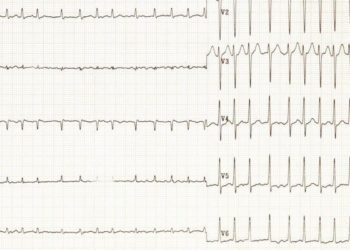The RACE-II trial: Lenient vs. strict rate-control in atrial fibrillation [Classics Series]
1. Lenient rate-control was found to be non-inferior to strict rate-control in managing patients with atrial fibrillation.
2. Compared to strict rate-control, lenient rate-control could be achieved with lower doses of medication and fewer medications.
Original Date of Publication: April 15, 2010
Study Rundown: Atrial fibrillation is the most prevalent sustained cardiac arrhythmia. It is a condition characterized by tachycardia and irregular heart rate, which often results due to disorganized electrical signalling in the atria. The condition is associated with an increased risk of stroke, and anticoagulation is an important management consideration. Previously, rate-control and rhythm-control were both considered acceptable options for management. The AFFIRM and RACE trials demonstrated, however, that rate-control was not inferior and was also associated with fewer adverse events compared to rhythm-control. As a result, rate-control is now often the first-line approach for treating atrial fibrillation, along with appropriate anticoagulation.
While certain guidelines suggested stricter rate-control would reduce symptoms, reduce the incidence of heart failure, and improve survival, these recommendations were not evidence-based. The risk of certain adverse events is higher in patients undergoing stricter rate-control, including bradycardia and syncope. The RACE-II trial was a randomized, controlled trial designed to explore whether lenient rate-control (i.e., target resting heart rate <110 bpm) was inferior to strict rate-control (i.e., target resting heart rate <80 bpm, <110 bpm during exercise) in reducing the incidence of cardiovascular events in patients with atrial fibrillation. In summary, there was no significant difference between the two strategies in the risk of death from cardiovascular causes, hospitalization for heart failure, stroke, systemic embolism, major bleeding, and arrhythmic events (HR 0.84; 90%CI 0.58-1.21).
Click to read the study in NEJM
In-Depth [randomized, controlled study]: The study was conducted in 33 centres in the Netherlands and involved 614 patients. Patients were eligible if they had atrial fibrillation for up to 12 months, were ≤80 years of age, had a mean resting heart rate >80 bpm, and were using oral anticoagulation therapy. Included patients were randomized to the lenient control strategy (i.e., target resting heart rate <110 bpm) or the strict control strategy (i.e., target resting heart rate <80 bpm, <110 bpm during exercise). The primary outcome was a composite of death from cardiovascular causes, hospitalization for heart failure, stroke, systemic embolism, major bleeding, and arrhythmic events (e.g., syncope, sustained ventricular tachycardia, cardiac arrest). Secondary outcomes included components of the primary outcome, along with all-cause mortality, symptoms, and functional status.
At the end of the follow-up period, the resting heart rates were 85±14 and 76±14 in the lenient- and strict-control groups, respectively (p<0.001). It was found that lenient control was noninferior to strict control in preventing the primary outcome (HR 0.84; 90%CI 0.58-1.21). Moreover, there was no significant difference in all-cause mortality (HR 0.91; 90%CI 0.52-1.59). There were no significant differences between the two groups in symptoms associated with atrial fibrillation, including dyspnea, fatigue, and palpitations. Additionally, there was no significant difference between the two groups in terms of heart failure functional status. Lenient rate-control could be achieved with significantly lower doses of medications and significantly fewer medications than strict rate-control.
Image: PD
©2012-2014 2minutemedicine.com. All rights reserved. No works may be reproduced without expressed written consent from 2minutemedicine.com. Disclaimer: We present factual information directly from peer reviewed medical journals. No post should be construed as medical advice and is not intended as such by the authors, editors, staff or by 2minutemedicine.com. PLEASE SEE A HEALTHCARE PROVIDER IN YOUR AREA IF YOU SEEK MEDICAL ADVICE OF ANY SORT.




